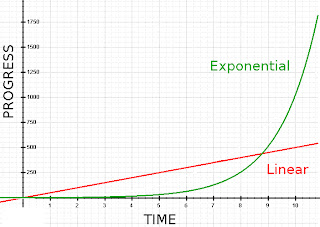I just learned of a new and interesting rare problem that a few people suffer from and think that it applies well to religious people and specifically how they prefer to answer one type of question. The idea to write this came from David Eagleman's book Incognito, so I'll just plug it for a second. It's a book that expands on the idea of how the mind constructs reality and the importance of the subconscious, so if I haven't jaded you from the subject it's worth a look at.
Anton's syndrome or Anton-Babinski syndrome is a problem that happens when there is damage to the occipital lobe. It causes a person to become completely blind, but the sufferers don't immediately report any problem at all. Not all that interesting so far. What is interesting is that this blindness is also coupled with two other symptoms, the lack of awareness of the blindness and the creation of the objects around them through the mind only.
All this means that the person will be completely blind, but will still think that they can see. Their condition is only exposed when someone else notices that what they say or how they act, turns out to be independent of the visual reality around them. A doctor will put up there hand and ask how many fingers they are holding up and the person will reply '3' when the doctor never lifted their hand in the first place, they will walk straight into walls and trip over anything put in front of them. What they are seeing is a complete fabrication generated by their mind and a fabrication that is independent of sensory information from the eyes. People with Anton's syndrome are living in completely in a visual world of their own creation.
This is what I feel like happens to an ultra-religious person and explains a nonsensical answer that is commonly given to a simple question. The questions of, 'Where is god?' or 'Where is the proof for god?' is commonly answered with the statement that "God is all around you." or "I see God in the leaves, the tide, and the stars....I see God in everything."
Now I have looked at many leafs and still have yet to find the God part of the leaf. These people are seeing what is an Anton's Syndrome like connection. There is something that makes it evident that God is a part of that thing that they are seeing, a part of the mind is coloring the view of what they are seeing. These people too are living in a world of there own creation that has no connection with reality, tripping over God and not noticing that the doctor's arm had never moved.
Now, it may be fair to criticize this view and say the people that are making these comments are making a metaphorical statement and surely some people are. It is always the charitable thing to take the strongest or most logical sense of what someone is saying. Yet, I don't think that the people making those kinds of blanket statements are always describing something metaphorically, they could be seeing the fingerprint of God on everything and must be taken literally when they say, "Yes, I see God in nature and not just his handiwork."
Perhaps, like in left temporal lobe epilepsy, there is a physiological mistake being made and people really are 'seeing something', but whether the connection is real or not Anton's syndrome provides an interesting way to interpret literally seeing God in the world.
Then again they would probably use Anton's syndrome to deconstruct what I'm saying in the same way, I once was blind but now can see seems to imply exactly that.
The only problem with that is, I've never heard anyone say that they 'See evolution in the leaves' or 'The big bang in the rocks', although you could say that you hear evidence of the big bang in the cosmic background radiation. You can't really see a process in a picture, in the same way you can apparently see God.
In one world I can point to the leafs and say "There are some leaves." and there can be an agreement, in the other you can look at leaves and say "I see God.", but you can't see it, and they tell you to look harder still, yet how hard must one look to see that emperor doesn't have any clothes?
Thanks for reading,
-the moral skeptic




































